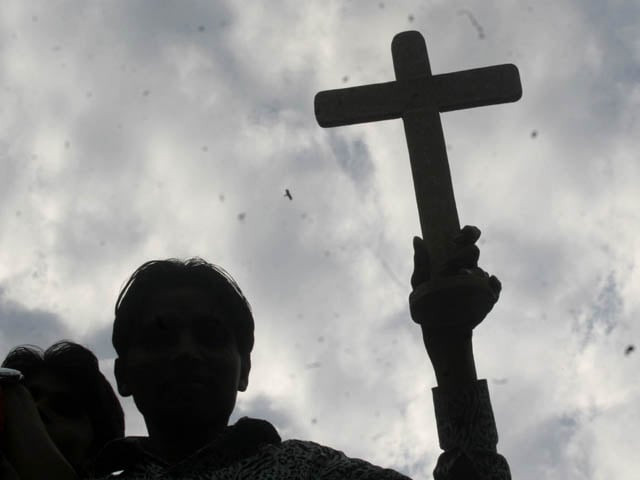The minority vote: ‘For whoever can protect us’
Christians in the Punjab more inclined towards the PML-N and PPP. Religious parties more popular in KP.

The US Commission on International Religious Freedom, in its annual report says “A climate of impunity” has been created by blasphemy and other discriminatory laws. PHOTO: ATHAR KHAN/EXPRESS/FILE
Christian voters from Joseph Colony, where an angry mob torched over a 100 homes two months back, have indicated partiality towards the two largest political parties in the country in the coming elections.
The governments led by Pakistan Peoples Party and Pakistan Muslim League- Nawaz are said to have given as much as Rs500,000 to each family affected in the incident.
“They helped us cover our losses so all of us have decided to vote for them,” said factory worker Sohail Masih.
The PML-N is tipped to win in the Punjab, home to the largest Christian community in the country.
Father Andrew Nisari, of the Sacred Heart of Jesus Cathedral, said his congregation feared conservative political parties and favoured the PML-N and PPP. “Christians here prefer to vote for liberal and progressive parties,” he said.While most voters in Jospeh Colony said they will vote PML-N for the provincial assembly and PPP for the National Assembly, many Christians in the Khyber Pakhtunkhwa have said they will back Islamist parties.
In Peshawar, for example, several Christian candidates have aligned themselves with and sought protection from parties like the Jamaat-i-Islami.

Pervaiz Masih, a JI candidate, was first elected to the parliament on a JI seat in 2002 and will contest the coming elections on the same seat. A resident of one of the frontline areas of the Taliban insurgency, Masih believes that religious parties can provide the best support to his community.
“In August, 2009, some Christians were drinking alcohol near a mosque during the call for prayer here in Peshawar.
Several Muslims, furious over the incident, had gathered in the area. I spoke to JI members and they persuaded the men to go back,” he said, giving an example of protection extended by the JI.
Masih said, “God ordered me to work here in a religious party, I am a bridge between Christians and Muslims.”
As many as 86 million registered voters are set to go to the polls on Saturday to elect 272 members directly to the parliament. Another 60 seats are allotted to women and 10 to religious minorities in the National Assembly, based on proportional representation.
Christian lawmakers cannot be directly elected. They are accorded tickets by parties in a process criticised as selection rather than election.
The Christian community comprises two per cent of the population. The community is largely poor and complains of increasing discrimination.
The US Commission on International Religious Freedom, in its annual report, said the risk to minorities in Pakistan had reached a crisis level. “A climate of impunity” [for offences against minority citizens] had been created by blasphemy and other discriminatory laws, the report said.
Punjab has seen some of the worst cases in the last few years. A Christian woman was sentenced to death for blasphemy in 2010. In 2009, as many as 77 houses were burned and seven were killed in Gojra on rumours that a Quran had been desecrated.
Back in Joseph Colony, few people believe that Islamists can protect them.
Samuel, a medical student, says he would consider voting for a religious party if it helped Christians and minorities. But he’d also rather leave Pakistan because “minorities don’t have security here,” he says.
Published in The Express Tribune, May 7th, 2013.



















COMMENTS
Comments are moderated and generally will be posted if they are on-topic and not abusive.
For more information, please see our Comments FAQ